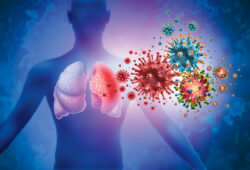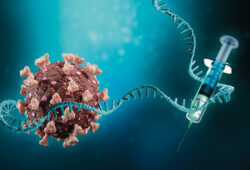Member hospitals create rapid tests for COVID-19, helping in the fight against the pandemic
When COVID-19 diagnostic tests originally became available, it often took several days to get results. This delay posed myriad problems—namely, the potential for faster spread and higher rates of infection. Without immediate results, patients might not have adequately self-quarantined, and healthcare systems couldn’t efficiently triage patients suspected of having the virus.
Two HealthTrust member hospitals began combating this problem in March and April by offering rapid-response tests that provided same-day results.
Tests ramp up
According to a press release from Hackensack Meridian Health, the largest health network in New Jersey, its Center for Discovery and Innovation (CDI) received emergency use authorization from the Food and Drug Administration (FDA) in March for a rapid-response COVID-19 test. The test combines elements from others: one adopted by the World Health Organization (WHO) and one developed by the Centers for Disease Control and Prevention (CDC). Results are available within hours of testing.
As of May, Hackensack Meridian Health could test 24 patients every eight hours, a number they anticipated growing.
Scripps Health, a health system based in San Diego, also began using a rapid-response COVID-19 test at all five of its campuses in early April, according to its website. The test is conducted through Abbott Laboratories’ “ID NOW” testing instrument, which had previously been used to detect the flu and strep throat. The ID NOW system can provide COVID-19 results in as little as five minutes.
As of May, Abbott was manufacturing 50,000 tests per day (around 1.5 million per month), and by June, it had shipped more than 3 million total tests.
Beyond testing for the virus itself, health organizations are working hard at discovering fast ways to test for immunity to the coronavirus. In April, member health system CHRISTUS Health developed a new blood test to check for resistance to COVID-19 after infection—with results delivered in 10 minutes. Offering immunity testing first to its staff and patients, the health system aimed to use the test to help workers feel safer testing patients. Its development could lead the way to more widespread, rapid immunity testing to help facilitate communities reopening.
A matter of accuracy
Researchers from the Cleveland Clinic tested specimens positive for COVID-19 to determine which diagnostic tests were the most reliable. They found that Abbott Laboratories’ ID NOW device detected the virus in 85.2% of the samples, meaning around 15% of patients would receive a false negative result. (Abbott has defended its test, citing that the detection rate could be skewed because samples were stored in a solution prior to being tested.)
For comparison, the CDC’s official test, for which results take a few days, had a 100% detection rate. Another test from Cepheid, a molecular diagnostics company, which has a response rate within an hour, had a detection rate of 98.2%.
Share Email COVID-19, Q3 2020





